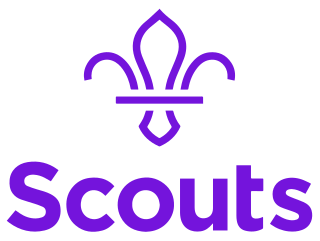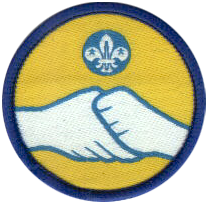
Scouting, also known as the Scout Movement, is a worldwide youth movement employing the Scout method, a program of informal education with an emphasis on practical outdoor activities, including camping, woodcraft, aquatics, hiking, backpacking, and sports. Another widely recognized movement characteristic is the Scout uniform, by intent hiding all differences of social standing in a country and encouraging equality, with neckerchief and campaign hat or comparable headwear. Distinctive uniform insignia include the fleur-de-lis and the trefoil, as well as merit badges and other patches.

A Scout is a child, usually 10–18 years of age, participating in the worldwide Scouting movement. Because of the large age and development span, many Scouting associations have split this age group into a junior and a senior section. Scouts are organized into troops averaging 20–30 Scouts under the guidance of one or more Scout Leaders or Scoutmasters. Troops subdivide into patrols of about 6–8 Scouts and engage in outdoor and special interest activities. Troops may affiliate with local, national, and international organizations. Some national Scouting associations have special interest programs such as Air Scouts, Sea Scouts, outdoor high adventure, Scouting bands, and rider Scouts.
Sea Scouts are a part of the Scout movement, with a particular emphasis on boating and other water-based activities on the sea, rivers or lakes. Sea Scouts can provide a chance to sail, cruise on boats, learn navigation, learn how to work on engines and compete in regattas. Sea Scouts often have distinctive uniforms. In some countries or Scout organizations, Sea Scouting is a program just for older Scouts.

Cub Scouts, Cubs or Wolf Cubs are programs associated with Scouting for young children usually between 7 and 12, depending on the organization to which they belong. A participant in the program is called a Cub. A group of Cubs is called a 'Pack'.

The Scout Association is the largest Scouting organisation in the United Kingdom and is the World Organization of the Scout Movement's recognised member for the United Kingdom. Following the origin of Scouting in 1907, the association was formed in 1910 and incorporated in 1912 by a royal charter under its previous name of The Boy Scouts Association.
Special education is the practice of educating students in a way that accommodates their individual differences, disabilities, and special needs. This involves the individually planned and systematically monitored arrangement of teaching procedures, adapted equipment and materials, and accessible settings. These interventions are designed to help individuals with special needs achieve a higher level of personal self-sufficiency and success in school and in their community, which may not be available if the student were only given access to a typical classroom education.

The World Association of Girl Guides and Girl Scouts is a global association supporting the female-oriented and female-only Guiding and Scouting organizations in 152 countries. It was established in 1928 in Parád, Hungary, and has its headquarters in London, United Kingdom. It is the counterpart of the World Organization of the Scout Movement (WOSM). WAGGGS is organized into five regions and operates five international Guiding centers. It holds full member status in the European Youth Forum (YFJ), which operates within the Council of Europe and European Union areas and works closely with these bodies.
The buddy system is a procedure in which two individuals, the "buddies", operate together as a single unit so that they are able to monitor and help each other. As per Merriam-Webster, the first known use of the phrase "buddy system" goes as far back as 1942. Webster goes on to define the buddy system as "an arrangement in which two individuals are paired .” The buddy system is basically working together in pairs in a large group or alone. Both the individuals have to do the job. The job could be to ensure that the work is finished safely or the skill/learning is transferred effectively from one individual to the other.

Youth work is community support activity aimed at older children and adolescents. Depending upon the culture and the community, different services and institutions may exist for this purpose. In the United Kingdom youth work is the process of creating an environment where young people can engage in informal educational activities. Different varieties of youth work include centre-based work, detached work, school-based work and religion based work. Throughout the United States and Canada, youth work is any activity that seeks to engage young people in coordinated programs, including those that are recreational, educational, or social by nature and design.

Rover Scouts, Rovers, Rover Scouting or Rovering is a program associated with some Scouting organizations for adult men and women. A group of Rovers is called a 'Rover Crew'.

A Scout leader or Scouter generally refers to the trained adult leader of a Scout unit. The terms used vary from country to country, over time, and with the type of unit.
Lone Scouts are members of the Scout movement who are in isolated areas or otherwise do not participate in a regular Scouting unit or organization. A Lone Scout must meet the membership requirements of the Scouting organization to which they belong and have an adult Scout leader or counselor who may be a parent, guardian, minister, teacher, or another adult. The leader or counselor instructs the boy and reviews all steps of Scouting advancement. Lone Scouts can be in the Scout Section or sections for older young people, and in some countries in the Cub section or sections for younger boys. They follow the same program as other Scouts and may advance in the same way as all other Scouts.
Beavers is a program associated with some Scouting organizations generally for children aged 6 to 8 who are too young for the Cub program.

A Scout Group is a local organizational structure in some Scouting organizations that consists of different age programs, gender units and/or multiple units of the same age program.

Religion in Scouting and Guiding is an aspect of the Scout method that has been practiced differently and given different interpretations in different parts of the world over the years.

Scouting has sometimes become entangled in social controversies such as in nationalist resistance movements in India. Scouting was introduced to Africa by British officials as an instrument of colonial authority but became a subversive challenge to the legitimacy of British imperialism as Scouting fostered solidarity amongst African Scouts. There are also controversies and challenges within the Scout Movement itself such as current efforts to turn Scouts Canada into a democratic organization.
Carers' rights are rights of unpaid carers or caregivers to public recognition and assistance in preventing and alleviating problems arising from caring for relatives or friends with disabilities. The carers' rights movement draws attention to issues of low income, social exclusion, damage to mental and physical health identified by research into unpaid caregiving. In social policy and campaigning the movement distinguishes such people's situation from that of paid careworkers, who in most developed countries have the benefit of legal employment protection and rights at work. With an increasingly ageing population in all developed societies, the role of carer has been increasingly recognized as an important one, both functionally and economically. Many organizations which provide support for persons with disabilities have developed various forms of support for carers/caregivers as well.
Special needs dentistry, also known as special care dentistry, is a dental specialty that deals with the oral health problems of geriatric patients, patients with intellectual disabilities, and patients with other medical, physical, or psychiatric issues.
Special educational needs (SEN), also known as special educational needs and disabilities (SEND) in the United Kingdom refers to the education of children who require different education provision to the mainstream system.
There are many national organisations in the United Kingdom that have been established to provide services to people under the age of 18.











